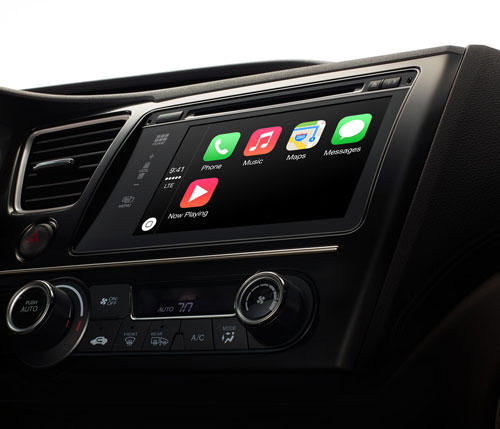| Feb 15, 2015 |
Is Apple making an electric car to battle Tesla, Google or Climate Change?
|
|
(Nanowerk News) If you thought it has been a while since you heard any more rumours about the long-awaited Apple TV, they are about to be replaced by even more exciting possibility that Apple may be about to build an electric car. The Wall Steet Journal kicked things off with a report that Apple had been hiring “hundreds” of staff with automotive design skills to work on a project called “Titan” that may be a self-driving electric vehicle configured in a (not-so-exciting) mini-van design.
|
 |
| Apple CarPlay
|
|
There are several back-stories to this potential move by Apple. In one, we see continuing competition with rival Google, who has been working on a driverless car for some time and are saying that they will be launching a commercial version onto the market between 2017 and 2020. Google’s motivation behind the self-driving car has been the development of the artificial intelligence software capable of pulling off this feat. Even if the car is not successful, the AI software will have a range of applications and possibility that would make the project still worthwhile. Increasingly, Apple has shown its willingness to develop its own capability in a range of competitive technologies that it can incorporate into products.
|
|
In another back-story, there is electric car company Tesla whose CEO, Elon Musk, has claimed that it will be as big financially, as Apple, within a decade. This will in part be based on the release of the Model 3, an affordable (US $35,000) family car with a range of 200 miles. Part of Tesla’s strategy appears to include the poaching of numerous Apple staff. Although it seems that Apple has been reciprocating by offering Tesla staff large signing bonuses to move to Apple.
|
|
And finally there is the view that electric cars, self-driving or otherwise, represent the future of transportation, especially a climate-friendly and sustainable one. At first sight, this may be a bit hard to believe when you consider that the top 3 selling vehicles in the US in 2014 were “pickup trucks”. At the same time, hybrid electric vehicles represented less than 3% of all cars sold. Still, there is continuing interest by the car manufacturers in producing electric cars, if only as a hedge. GM has announced their new 200 mile range Chevy Bolt that will retail at around the same price as Tesla’s Model 3.
|
|
There is little doubt that Apple could move into car manufacturing. With US $180 billion in cash, it could buy Fiat Chrysler, Tesla, General Motors and Ford outright.
|
|
There is also no doubt that with its ability to bring design and innovative computing to an industry employing technology that significantly lags that found in an iPhone. Apple and Google have both made moves to create in-vehicle media interfaces based on their systems. Apple’s CarPlay will start to appear in cars this year. Customers who can’t wait can buy after-market devices from Pioneer.
|
|
Apple’s motivation to build an electric car may be driven by competition with Google, Tesla and others. It may be also finding a new business that doubles its value to $1.3 trillion as predicted by Carl Icahn. Alternatively however, it may be genuinely interested in building a technology that makes driving more sustainable and less dependent on oil. Apple is set to invest $3 billion in new solar farms in California and Arizona to provide energy for its operations there.
|
|
Apple CEO Tim Cook recently told investors: “We know that climate change is real,” Cook said on Tuesday. “Our view is that the time for talk has passed, and the time for action is now. We’ve shown that with what we’ve done.”
|
|
Whether Apple’s electric cars are aimed at combating climate change will depend on how they are manufactured and how the recharging infrastructure, which is still largely to be built in the US and globally, is run. Apple throwing its weight behind this infrastructure being built at all would certainly help making electric cars a more popular possibility.
|

